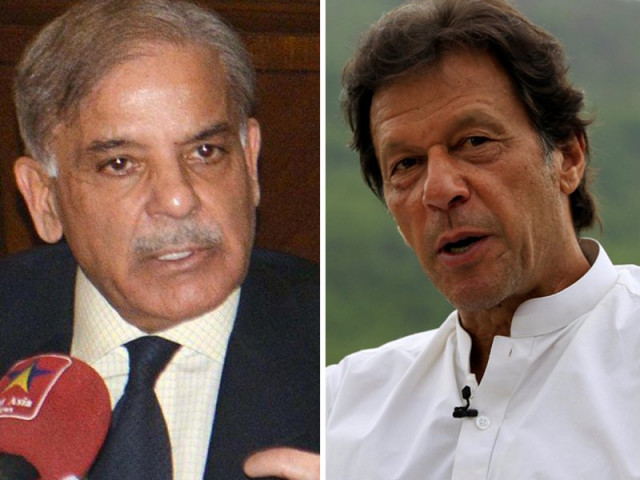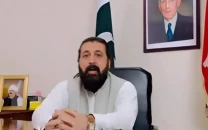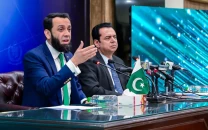PM floats new names as consensus on CEC eludes
Parliamentary committee to convene again on Monday to vet nominees

Shehbaz Sharif and Imran Khan. FILE PHOTOS
The constitutional slot has been lying vacant since Dec 6, 2019 when Justice (retd) Sardar Muhammad Raza retired as CEC, leaving the Election Commission of Pakistan (ECP) virtually dysfunctional. Currently, Altaf Qureshi is acting as CEC.
The prime minister’s move came as a parliamentary panel mandated to finalise two ECP members and CEC failed to break the persisting deadlock on the issue which, analysts say, shows political immaturity of politicians.
Prime Minister Imran proposed three names for the CEC slot in a letter addressed to opposition leader in the National Assembly Shehbaz Sharif. The picks include retired top bureaucrats Jameel Ahmed, Fazal Abbas Maken and Sikandar Sultan Raja.
In his letter, the prime minister said he was reaching out to the PML-N president for “meaningful dialogue” over the matter. He added that he wanted to resolve this long-standing issue amicably.
Consultation between the prime minister and the opposition leader is constitutionally mandatory for the ECP appointments. “The prime minister shall in consultation with the leader of the opposition in the National Assembly, forward three names for appointment of the commissioner to a parliamentary committee for hearing and confirmation of any one person,” reads Article 213(2A) of the Constitution.
The Pakistan People’s Party (PPP) on Wednesday proposed the name of former attorney general for Pakistan Irfan Qadir for the post. The PML-N has indicated the PPP nominee could be acceptable to them, according to sources.
The new names have been floated after the opposition refused to support any of the three earlier nominees of the government including Babar Yaqoob Fateh, Arif Khan and Fazal Abbas Maken. The opposition was pushing for its nominees, Nasir Mahmood Khosa, Jalil Abbas Jilani, and Akhlaq Ahmad Tarar – none of whom could win government’s endorsement.
The Islamabad High Court on Wednesday granted another 10 days to the government to finalise the ECP appointments.
The 12-member parliamentary committee convened for 11th time at the Parliament House on Friday with Shireen Mazari in the chair. The meeting ended inconclusively and would reconvene on Monday.
Government’s representative Azam Swati said the government and the opposition should send their respective nominations for the vacant slots of ECP members from Sindh and Balochistan, but the opposition wants appointment of CEC and ECP members at the same time.
“That’s enough,” Swati said, “There should be a consensus now. We want consensus on a name for the CEC slot.” He added that the government’s nominations were “ready in sealed envelopes” and could be shared with the committee anytime.
However, he said the government would propose an “alternative formula” on Tuesday, if the committee fails to develop consensus on Monday.
PML-N’s member of the committee Mushahidullah Khan hoped the government would share its nominations with the opposition after which it would also unveil its nominees for the vacant slots. “We expect to reach consensus in the next [Monday’s] meeting.”
On Friday, the Senate Standing Committee on Parliamentary Affairs chaired by Senator Pervaiz Rashid was told that the government and the opposition had reached a consensus on the ECP appointments.
Senator Dr Sikandar Mandhro, who is also a member of the parliamentary committee, informed the panel that the deadlock between the government and the opposition had been broken.
Senator Waleed Iqbal said a bill was under consideration to refer the matter to the Supreme Court in case the government and the opposition could not decide the names.
The senators were of the view that the parliamentary committee should make further rules to avoid a deadlock on the issue of appointments in future.
Election Commission Secretary Zafar Iqbal told the committee that electoral rolls had been displayed and the voters could register, change their voting location, or make other objections by filling out different forms. He said a voter awareness campaign had been running in the media.
The committee expressed concern over non-registration of women in the electoral rolls for not having national identity cards. The panel directed the National Database and Registration Authority (NADRA) to take proactive steps for issuance of CNICs to help enroll women in their electoral rolls in which 12 million voters were already registered.
(WITH ADDITIONAL INPUT FROM APP)



















COMMENTS
Comments are moderated and generally will be posted if they are on-topic and not abusive.
For more information, please see our Comments FAQ